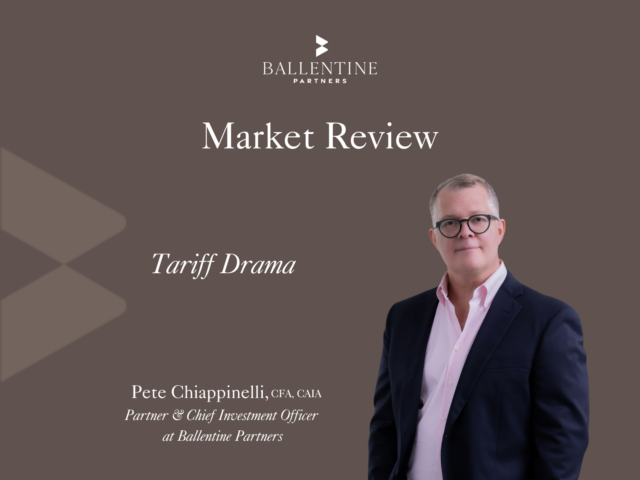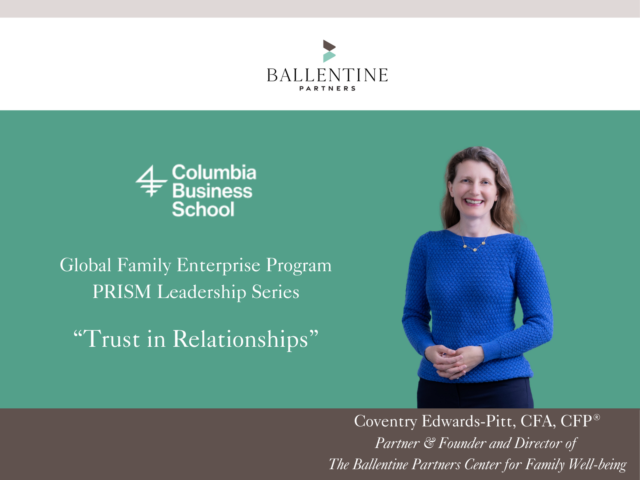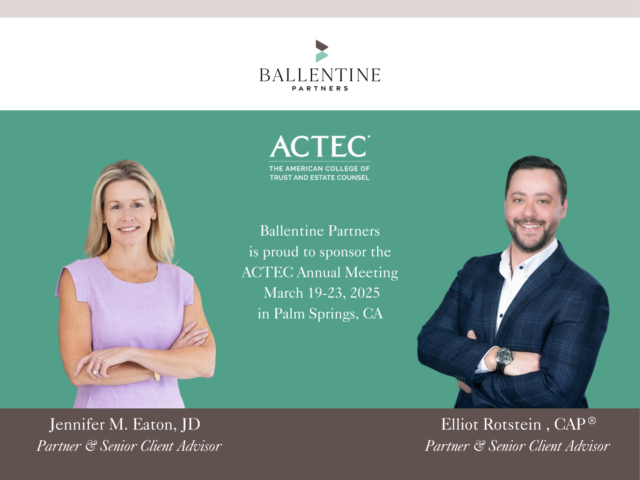Coventry Edwards-Pitt spoke with Joe Reilly about her book Aged Healthy, Wealthy & Wise.
Joe Reilly from Family Wealth Report interviewed our very own Coventry Edwards-Pitt about her book Aged Healthy, Wealthy & Wise. Here’s a snippet of some of their discussion:
Joe Reilly: I just read your recent book, which was a follow-up to your wonderful book about children of wealth – Raised Healthy, Wealthy and Wise. I understand you have been touring around and giving talks about both books. Why did you want to do this book?
Coventry Edwards-Pitt: We’re all hearing these days about exciting advances in longevity and life span. The trick is, longevity is only a gift if you know how to use it. I’ve learned in my work that aging is a topic that most people instinctively avoid – people tend to fear it and as a result don’t want to talk about it, and they don’t want to think about it. The problem with not thinking about it, though, is that in avoiding it, we give up on our chance to do the intentional planning that would mitigate so many of the things we fear. So, I wanted to apply the positive, success-story format that worked well with my first book on the topic of aging so that people would be inspired to read it and engage with this subject. Also, something I learned myself when writing this book is that it can be life-changing to truly contemplate mortality – to seriously engage with the reality that our time here is finite. This book is in many ways about the power of goal setting – how we can be intentional and make the best use of all the days that we have – and that is a topic that is universal and relevant at any age.
I was curious about how many interviews you did for this book?
About forty. I interviewed inspiring older people about what they were doing to lead vibrant later lives and I interviewed middle-aged children who were grateful for something their parents had done that allowed them to have less discord with their siblings when their parents died. I also interviewed more experts with this book than the first book, people like David O’Neil of Story Trust and others who are known in this space. You know, I really love talking to people and hearing their stories. There are a lot of good advice books out there, but I feel that stories make it real, and make it something people can relate to. I feel lucky because I got to speak to all of these amazing older people, and now, three years on from when I conducted the interviews, I still carry these inspiring voices and stories in my head. It’s motivating. I hope people who read the book will feel the same.
How did you find your subjects?
I was looking for the people who we would all want to be. People who you look at and think that it would be awesome if that were my life at eighty-five. They are positive, they seem engaged, they are generally content. I knew a number of people like this within my client base and then I was introduced to others who people knew were leading interesting, vibrant lives.
Getting old is not a fun topic. Was it hard to get people to talk about it?
It was a bit harder than the first book. With the first book, I was talking to adult children about how their parents raised them to become productive, motivated, and engaged in life. It was an easier angle, because I wasn’t asking people to talk about themselves as much as about what they had appreciated that someone else did for them. In this book I’m saying “Hey I’m writing a book about aging! And I’ve identified you as someone who is aged and a vibrant elder.” Do you want to be interviewed? Some would say “Great, what a compliment! Sure!”, but I did hear quite often, “I haven’t really thought about aging,” or “I don’t have much to say,” or “Even though I’m 85, this whole topic feels irrelevant, because inside I’m a 42 year-old!” (It turns out, that’s a great and helpful attitude to have!) So, sometimes it took a bit more coaxing with this book, but then, of course, as we got going, there was a ton to talk about, and at the end of every conversation everyone thought it was really enlightening and so interesting, and they wanted to go home and ask their husband or wife these questions.
Did you find that you needed a lot of money to adopt the success factors that you identify in the book?
I often get asked about this during my book talks, but I found it was hard to find the particular ways in which money was required to manifest these positive characteristics in your life. So many of the things that I discovered are key are actually free. You can volunteer for free, learn new things for free, engage with others for free, and there are so many ways to keep active. It’s true that money can help in a big way with healthcare (for instance, the peace of mind and access of concierge care) and it’s also helpful in housing. If you can buy into these really lovely places or if you can afford the $9,000 monthly rent for an independent senior living place, then obviously that’s great. These environments can make it easier to focus on learning and engaging with others, because things are simplified in your life, you can take classes all day, and you can socialize because there are dinners and gatherings all the time which are arranged for you. But there are ways to access these types of communities for a lot less – for instance senior centers in towns or free community programs at libraries. There was once a really poignant comment on this issue at one of my book talks. I was speaking and a woman in the audience raised her hand and said “Well don’t you need money to do all these things?” And another woman in the audience raised her hand and said “Let me tell you something, I am a hospice worker and I work in Dorchester and I work in Wellesley. And when I work in Dorchester, the people who are dying are surrounded by loved ones and friends and family, and when I visit the people in Wellesley, they are often alone.”
What surprised you the most in your research?
I hoped that my interviews with the older people I identified could touch on two things – how you lead a vibrant later life and how you can tackle end-of-life planning in a positive, proactive way. But I ended up finding that there is a highly negative correlation between living a vibrant, thriving later life and actually doing any end-of-life planning! Turns out fewer than 10 per cent of the people I spoke with had done any serious thinking regarding their end of life. So I had to find another group of people to speak with who had done some planning to be able to share these stories. This was an interesting finding in and of itself. If you feel young and vibrant, you feel like you are not going to die any time soon, so you don’t do any planning. I concluded as a result of doing the book that we actually need a balance – it’s probably best to spend most of your waking hours feeling young and vibrant (and that death is irrelevant!) but reserve some mental energy to do the type of planning that will either keep you healthy (like a colonoscopy) or preserve family harmony (like talk about how you’d like things to go in your last days.)
…
Read the full interview here.
Learn more about Family Wealth Report.
Click here to learn more about Coventry Edwards-Pitt.
Order a copy of the Healthy, Wealthy & Wise Collection.




